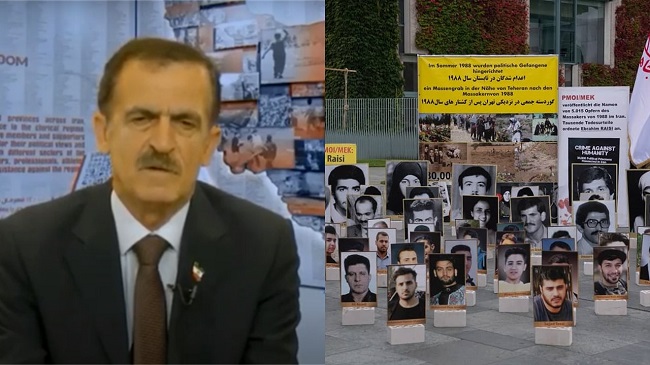
From the beginning of 1982, Asghar Mehdizadeh was imprisoned as a political prisoner in Iran, where he bore witness to the brutal tortures and executions at the hands of the Iranian regime. He recalled in great detail of the events of the summer of 1988, where 30,000 political prisoners were sentenced to be executed in minute long trials for being allied with the Iranian Resistance movement.
Mehdizadeh was imprisoned for 13 years at Gohardasht prison, during which time he was subjected to brutal torture and mistreatment for being a member of the People’s Mojahedin Organization of Iran (PMOI/MEK).
In the summer of 1988, then-Supreme leader Ruhollah Khomeini issued a fatwa, declaring MEK supporters as ‘enemies of God’ and ordering them to be executed. Panels of clerics and judiciary officials, known as ‘Death commissions’, were set up to implement this fatwa across Iran.
Mehdizadeh said, “Roughly between July and September 1988, over 30,000 political prisoners, mostly MEK supporters, were killed in the political wards of Iranian prisons. I personally bore close witness to dozens of them and indirect witness to hundreds more.”
Mehdizadeh explained that during the massacre, he and his fellow prisoners were able to communicate in morse code to inform each other of what they were about to face, but he said that the stories passed around did not prepare him for what he would witness when it was his turn to be blindfolded and led to the death hall.
The prison authorities first led the prisoners straight to the death halls, so that they could see first-hand what the end result would be once they had passed through the death commission. It seems that this was to intimidate the prisoners and scare them into denouncing their affiliation with the MEK.
Mehdizadeh said, “When my blindfold was removed in the death hall, I was confronted with the sight of corpses lying scattered at the base of a staging area for the executions. On the platform, I saw a dozen MEK supporters who had been taken in before me, each standing on a chair with a rope tied around their neck.”
Despite what he witnessed in that hall leaving him with mental scars, Mehdizadeh said that he came away from that experience with a sense of pride of his fellow MEK members. The prisoners courageously accepted their fate and chanted slogans against the regime as they were led to the gallows.
To this date, none of the regime officials or prison authorities involved in the 1988 massacre have ever faced accountability for their actions. Many of the leading perpetrators have instead been rewarded with some of the highest positions within the regime, including the most notable perpetrator, Ebrahim Raisi, becoming the latest President of the Iranian regime.
During the massacre, Raisi was assigned as one of four officials who sat on the panel at the Tehran death commission. This panel oversaw the executions at the Gohardasht and Evin prisons.
Mehdizadeh said, “My own contact with Raisi was only fleeting, but countless other survivors of the massacre describe him as being even more ruthless than his colleagues and even more committed to implementing Khomeini’s comprehensive order of death for supporters of the MEK.”
Following the massacre, Raisi was later appointed by supreme leader Ali Khamenei to the role of head of the judiciary. In the 2019 nationwide uprising, Raisi oversaw the murders of 1,500 peaceful protesters and the arrests and tortures of thousands of others.
This year when Raisi was selected as a presidential candidate, the majority of Iranian people boycotted his election, however as Khamenei had already handpicked him to take over the role, his ‘victory’ had already been set.
The National Council of Resistance of Iran (NCRI) said, “Since then, Iranian activists have been tirelessly urging the international community to take steps to isolate the new Iranian president and set the stage for his prosecution on charges of crimes against humanity and genocide.”